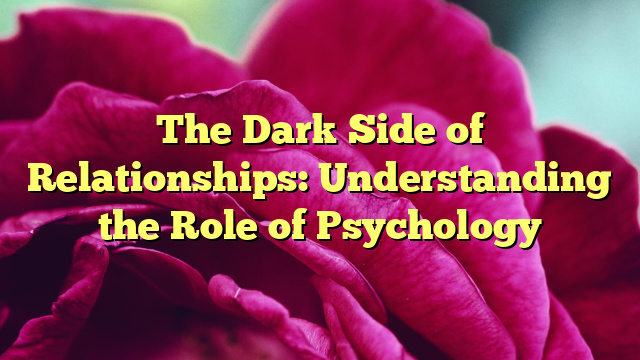The Dark Side of Relationships: Understanding the Role of Psychology
The Dark Side of Relationships: Understanding the Role of Psychology
Introduction
Relationships are an integral part of human life, providing us with love, support, and companionship. However, there is also a dark side to relationships that often goes unnoticed. This dark side is rooted in psychology and understanding its role is crucial for maintaining healthy and fulfilling relationships.
The Power Dynamics
One of the key aspects of the dark side of relationships is the power dynamics that exist within them. Power dynamics refer to the unequal distribution of power and control between partners. This can manifest in various ways, such as one partner exerting dominance over the other, controlling behaviors, or manipulation.
Understanding power dynamics is essential because they can lead to an unhealthy and toxic relationship. When one partner holds all the power, it can result in feelings of resentment, low self-esteem, and a lack of autonomy for the other partner. Recognizing and addressing these power imbalances is crucial for maintaining a healthy and equal relationship.
Manipulation and Control
Manipulation and control are common tactics used in relationships that fall under the dark side. Manipulation involves influencing or controlling someone’s behavior or emotions for personal gain. This can include tactics such as gaslighting, guilt-tripping, or emotional blackmail.
Control, on the other hand, refers to exerting dominance over a partner’s actions, thoughts, or decisions. This can include monitoring their activities, isolating them from friends and family, or dictating their choices. Both manipulation and control can have severe consequences on the mental and emotional well-being of the victim.
Emotional Abuse
Emotional abuse is another aspect of the dark side of relationships that is often overlooked. Emotional abuse involves using words, actions, or behaviors to manipulate, control, or degrade a partner. This can include insults, threats, humiliation, or constant criticism.
Emotional abuse can have long-lasting effects on a person’s self-esteem, mental health, and overall well-being. It is important to recognize the signs of emotional abuse and seek help if you or someone you know is experiencing it.
Infidelity and Betrayal
Infidelity and betrayal are perhaps the most devastating aspects of the dark side of relationships. Infidelity refers to engaging in sexual or emotional relationships outside of the committed partnership, while betrayal involves breaking trust in any form.
Infidelity and betrayal can cause immense pain, anger, and a breakdown of trust within a relationship. Recovering from these acts of betrayal requires open communication, therapy, and a willingness to rebuild trust. However, in some cases, the damage caused by infidelity and betrayal may be irreparable, leading to the end of the relationship.
Breaking the Cycle
Breaking the cycle of the dark side of relationships requires a deep understanding of psychology and self-reflection. It is essential to recognize the signs of an unhealthy relationship and take steps to address them.
Seeking therapy or counseling can be beneficial for both individuals and couples. Therapy provides a safe space to explore emotions, address underlying issues, and learn healthy communication and coping strategies. It can also help individuals break free from patterns of manipulation, control, and abuse.
Building Healthy Relationships
Understanding the dark side of relationships is not meant to discourage individuals from pursuing love and companionship. Instead, it serves as a reminder to be mindful of the potential pitfalls and to actively work towards building healthy and fulfilling relationships.
Building healthy relationships involves open and honest communication, mutual respect, and a willingness to grow and change together. It requires setting boundaries, recognizing and addressing power imbalances, and prioritizing the well-being of both partners.
Conclusion
The dark side of relationships is a complex and often overlooked aspect of human psychology. Understanding the role of psychology in relationships is crucial for recognizing and addressing the power dynamics, manipulation, control, emotional abuse, and betrayal that can occur.
By breaking the cycle and actively working towards building healthy relationships, individuals can create a foundation of love, trust, and mutual respect. It is through this understanding and effort that we can navigate the dark side of relationships and find true happiness and fulfillment.

